2018 Querciabella, Mongrana, Maremma Toscana DOC, Tuscan Coast, Italy.
The darkly rich and chocolaty Super Tuscan Mongrana Rosso by Querciabella is opulent on the full bodied palate with layers of layers of black fruits and polished tannins along with subtle floral elements, a light dusting of spices and has no oak influence. This vintage of Mongrana is well put together and extremely deep with an inky appearance in the glass, it’s a wine that hedonistically pleases the senses with its fruit density and mouth feel, but also gains in complexity as it opens and is best with robust foods that allow it to fill out its array of flavors that include blackberry, black cherry, plum and currant fruits that are nicely supported by anise, set new leather, minty herb, cigar wrapper and acacia flowers. The 2018 Querciabella Mongrana saw about 50% Sangiovese, 25% Cabernet Sauvignon and 25% Merlot, which has added greatly to this wine’s silky texture and ease of use as a young wine. This Mongrana was made from separate lots of all de-stemmed grapes with gentle fermentation and maceration, with a portion in stainless steel, after which the wine saw an élevage in cement vats exclusively where it was aged for at least 10 months, most years see a full 12 moths, until it was ready to be blended and then bottled. Everything here is about transparency and purity with the Maremma giving plenty of ripe character that doesn’t need any oak. Querciabella’s vines here are set on iron-rich soils of Maremma, with a mixture of silt and alluvial sand, that is sparse and has lots of gravel and surface pebbles. The terroir here with the Mediterranean influence allows for very compelling wines where these Bordeaux grapes and native varietals both do thrillingly well, but also the wines from here are great values with a super quality to price ratio.
The Querciabella property and winery was founded back in 1974, certainly not old by Tuscan standards, by Giuseppe “Pepito” Castiglioni who was an industrial entrepreneur by trade and a lifelong wine lover. Originally he bought a single hectare of vineyard on a Tuscan hillside, but that was only the beginning of project that would go to become a top Chianti Classico estate, and Pepito, as he was known, went on to expand the holdings to include vineyards throughout the region, with the Tuscan Coast area playing a key role. Quercisabella under the leadership of Pepito’s son Sebastiano Cossia Castiglioni saw the estate, in the late eighties go all organic and was one of the first wineries in Italy to employ these environmentally friendly methods and they are now in fact totally vegan as well. The winery notes that in 2000, Sebastiano introduced a 100% plant‑based approach to biodynamics, employed at Querciabello, that forbids the use of animal products on our vineyards or in our cellars. Once again, Querciabella was at the forefront of this caring and holistic approach to winemaking, making the Castiglionis very note worthy innovators in Italy’s wine industry and an inspiration in the historic Tuscan region. Querciabella has more than 100 hectares of vines in the Chianti Classico that are flanked by oak forests, old castles and rolling hills, and also in Maremma, where this wine comes from, an area that enjoys the rugged natural beauty of the less traveled Tuscan coastline. Maremma, like Bolgheri is notable for its perfect conditions to grow the Bordeaux varietals with Cabernet Sauvignon and Merlot doing extremely well here and play a big role along with Sangiovese here, as this wine shows. This bottling is a vintage to search out as it drinks wonderful now and looks to have the stuffing to even age a while as well, it should be enjoyed for the next 5 to 10 years and there is not a need to wait, especially for the price it sells for.
($28 Est.) 91 Points, grapelive
